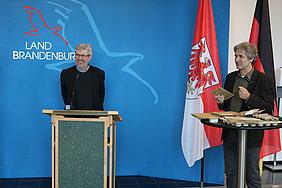Brandenburg's agriculture is largely based on the drainage of peatlands. On the one hand, this enables the cultivation of various crops such as rye or forage crops, but on the other hand, it leads to an enormous release of carbon dioxide (CO2). The greenhouse gas is released by the aeration of the peatlands formed over thousands of years and the associated decomposition of the organic soil. As a result, the drained peatlands currently occupy third place among the greenhouse gas emitters in Brandenburg, with more than 30 tonnes of CO2 equivalents per hectare and year. Only electricity generation from lignite and industry release more CO2 per year.
On Tuesday, March 14, 2023, ATB scientist Dr.-Ing. Ralf Pecenka was a guest at the Brandenburg State Chancellery in Potsdam to present possible uses associated with the rewetting of peatlands as part of the presentation of the new peatland protection programme by Environment and Agriculture Minister Axel Vogel. In addition to the conversion of arable land into grassland, the keeping of water buffaloes instead of dairy cows and the use for photovoltaics, the harvesting of wet meadow biomass can also create new value chains.
Dr.-Ing. Pecenka and his team are researching the agricultural use of rewetted moor soils at the ATB and how fibrous plant species such as reeds, sedges, reed canary grass or woody plants such as black alder could be used practically and profitably. In various projects, the focus is primarily on a material utilisation of the biomass, as this has a higher benefit for the environment compared to an energetic utilisation. "Moor biomass could be an important source of raw materials for sustainable products from Brandenburg in the future," explains Dr.-Ing. Pecenka.
"In our pilot plant, we are testing the processing and utilisation of a wide variety of fibre plants in order to produce sustainable products from them, such as plastic-free packaging materials, cardboard packaging, paper, bedding pellets or fibres for peat-free growing substrates. Thus, biomass from paludiculture, i.e. from peatland management, could also replace increasingly scarce wood fibres or even plastics," Dr.-Ing. Pecenka continues and presented product samples that have already been created. "For this, we are already cooperating with partners from industry, agriculture and the Brandenburg State Office for the Environment in several research projects."
Further information:
The peatland protection programme is a core element of natural climate protection in Brandenburg. The state of Brandenburg can only become climate-neutral in 2045 with a significant reduction in greenhouse gas emissions from the drained peatlands.
Peatland protection in Brandenburg

